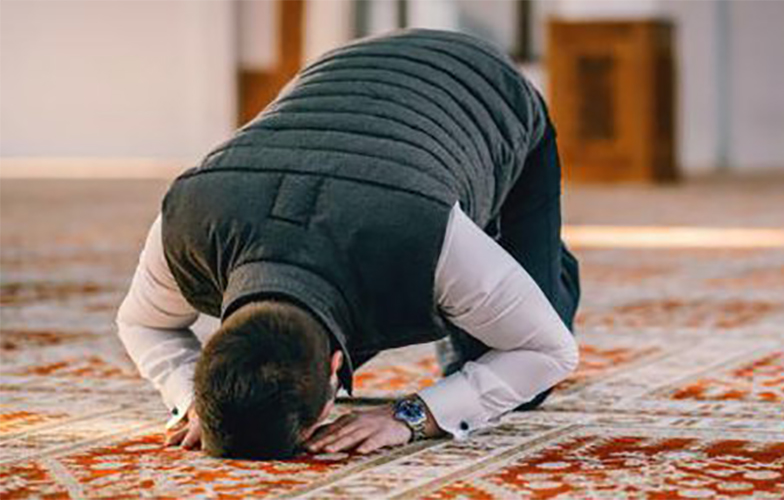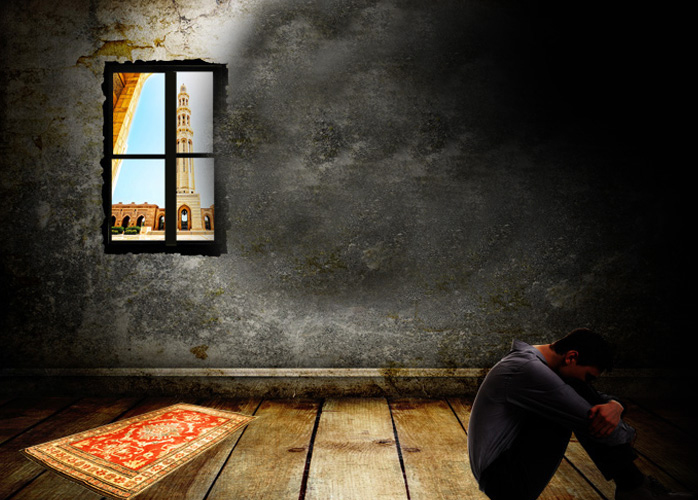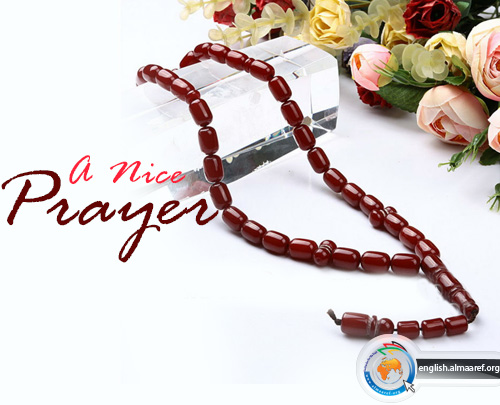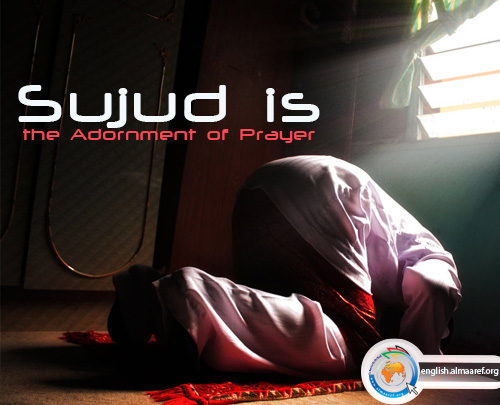Issue: Asha hadu anna Aliyyan Waliyyullah is not a part of either Adhan or Iqamah. However, it is preferable that it is pronounced with the intention of complying with the orders of the Almighty Allah. It is mentioned that Imam Sadeq (peace be upon him) had said: (If one of you had said that there is no god but Allah and Muhammad is Allah's Messenger, it is recommended to say that Ali is the Commander of the faithful)
In the Name of God, the Most Gracious, the Most Merciful
"Recite what is sent of the Book by inspiration to thee, and establish regular Prayer: for Prayer restrains from shameful and unjust deeds; and remembrance of God is the greatest (thing in life) without doubt. And God knows the (deeds) that ye do".
Morning Prayer: Two Bows
Noon Prayer: Four Bows
Afternoon Prayer: Four Bows
Dusk Prayer: Three Bows
Evening Prayer: Four Bows
First Bow (Raka)
Declare your intention: by saying in your heart: I pray the noon/afternoon/evening prayers - according to the difference in time - for the purpose of worship and purity, and to seek closeness to Allah Almight. (This is a non-verbal intention.)
1- Pronounce "Takbirat Al-Ihram" "Allahu Akbar" (Allah is Great) aloud. That phrase actually opens the prayers. It is preferable to raise both palms of the hands near the ears when pronouncing (Takbirat Al-Ihram).
Issue: Men and women must recite verses in a low voice during the noon and afternoon prayers.
2- Recite Al-Fatiha (the first chapter of the Qurían) correctly with another full chapter, such as "Al-Ikhlas Chapter", while you are still standing.(Takbirat Al-Ihram).
Issue: Men must recite verses in a loud voice during the dawn, dusk and evening prayers in the first and second units. Women, however, are permitted to recite the verses in low voice. As for the third and fourth bows, men and women must recite the verses/phrases in a low voice.
First Bow (Raka)
Declare your intention: by saying in your heart: I pray the noon/afternoon/evening prayers - according to the difference in time - for the purpose of worship and purity, and to seek closeness to Allah Almight. (This is a non-verbal intention.)
1- Pronounce "Takbirat Al-Ihram" "Allahu Akbar" (Allah is Great) aloud. That phrase actually opens the prayers. It is preferable to raise both palms of the hands near the ears when pronouncing (Takbirat Al-Ihram).
Issue: Men and women must recite verses in a low voice during the noon and afternoon prayers.
2- Recite Al-Fatiha (the first chapter of the Qurían) correctly with another full chapter, such as "Al-Ikhlas Chapter", while you are still standing.(Takbirat Al-Ihram).
Issue: Men must recite verses in a loud voice during the dawn, dusk and evening prayers in the first and second units. Women, however, are permitted to recite the verses in low voice. As for the third and fourth bows, men and women must recite the verses/phrases in a low voice.
3- Bow down; that is, to bow until your hands reach your knees and say, "subhana rabbiyal eazimi wa bihamdihi" "Glory be to my Lord, the Great, and praise belongs to Him," or "Glorified is my Lord (Allah); Glorified is my Lord (Allah); Glorified is my Lord (Allah)"
You have to be so serene and feeling secured when mentioning the obligatory phrases during bowing down.
Loud voice: It is when the essence of the sound is heard. Low voice: It is when the essence of the sound is not heard. When reciting Al-Fatiha (the first chapter of the Qurían) in the first and second bows of Noon and Afternoon Prayers, men are preferred to recite …In the Name of God (Allah), Most Beneficent, Most Merciful in a loud voice.
4- After bowing down (RUKU), stand up back again in an upright position. It is recommended that you say, (The Lord (Allah) shall hear the one who thanks, praises and glorifies Him).
5- Prostrate on natural ground (such as sand, rock, etc.) or whatever planted in the ground except anything that can be eaten or worn so that you put the seven prostration positions and lean on them. These positions are: the forehead, the two palms, the two knees and the two big toes.
Issue: It is recommended to supplicate during prostration and to ask for any earthly or heavenly needs.
During prostration, say, "subhana rabbiyal aila wa bihamdih" "Glory be to my Exalted Lord, and praise belongs to Him",or (Glorified is my Lord "Allah"; Glorified is my Lord "Allah"; Glorified is my Lord "Allah").
You have to be so serene and feeling secured when mentioning the obligatory phrases during prostration.
6- Raise your head up from prostration and sit straight. It is preferable to say, I ask my Lord (Allah) for forgiveness and to Him I repent, or (I ask forgiveness of God, my Lord, and turn towards him).
Issue: It is recommended that you say, (O God send your mercy and prayers on Muhammad and his posterity/descendentsî after bowing down and prostration (RUKU & SUJUD).
7- Prostrate again repeating what you said and did in the first prostration.
Sitting after the second prostration is called recess sit.
Reaching this stage, you have finished the first bow of a prayer.
Second Bow:
8- Stand up again to start the second bow by reciting Al-Fatiha (the first chapter of the Qura'n) with another full chapter.
9- Perform Konout Supplication after recitation. Konout supplication is preferable and recommended.
Among the recommended supplications in Konout is: (There is no Lord except Allah the Enduring, the Generous. There is no Lord except Allah the Glorified, the Great. Glorified is the Lord of the Seven Heavens, Seven Earths and what they encompass, the Lord of the Great Mercy seat. Praise be to the Lord (Allah).)
Raise your hands towards the sky with the palms as in the figure (1), that is, keep your hands in front of your face, turning the palms facing upwards, and keeping both the hands and the fingers close together, and supplicate anything, whether earthly or heavenly need.
10- Bow down and repeat what you had said and done in the first bow.
11- After raising your head up from the second prostration of the second bow, sit straight and say, "Ashhadu alla ilaha illal Lah, Wahdahu la sharika lah, Wa ashhadu anna Mohammadan abduhu wa rasouluh, Allahumma salli ala mohammadin wa eli Mohammad" (I bear witness that there is none worthy of worship besides Allah, and I bear witness that Muhammad is His Servant and Prophet. O God bless Muhammad and the progeny of Muhammad). By reaching this, you have finished the second bow.
Before your start reciting the bearing of witnesses, it is recommended that you say, (In the Name of Allah, and By Allah, Praise be to Allah and the best of names are for Allah). After reciting the bearing of witness, it is also recommended that you say, (O Lord! May You accept his redemption and extenuation and elevate his place).
Third Bow:
12- Stand up again in the upright position, and after you settle in that position recite the following:
First: Subhanal Llah.
Second: Wal hamdu lillah.
Third: Wa la ilaha illal Llah.
Fourth: Wal Llahuakbar.
(Glory be to God, and praise be to God; there is no god but Allah, and Allah is Greater). It is preferable that you repeat these praises three times, then you bow down and repeat exactly what you have done in the first bow.
Fourth Bow:
13- Stand up again in the upright position, and repeat exactly what you have done in the third bow.
Issue: The worshiper has the option of reciting either "Al-Fatiha" chapter or the aforementioned four praises in the third and fourth bows.
14- After you raise your head from the last prostration, recite the bearing of witness as mentioned earlier and then recite the Salutations by saying,
First: Assalamu ealaika ayyuhan nabiyyu wa rahmatullahi wa barakatuh.
Second: Assalamu ealaina wa ala ibadil Llehis saliheen.
Third: Assalamu ealaikum It's preferred to add wa rahmatullahi wa barakatuh.
(Peace be upon you, O Prophet, and God's mercy and blessing. Peace be upon us, and upon the righteous servants of God. Peace be upon you [all], and God's mercy and blessing.)
Issue: The foregoing is the best and most complete format of Salutations. However, the mandatory form of Salutations is: -Peace be upon us, and upon the righteous servants of God, (or)-Peace be upon you [all].
How to pray the Dawn Prayers (Al-Sobh)
In the Dawn Prayers, the prayer shall have to recite the bearing of witness and salutations directly after the second bow and must end his prayers at that exact point.
How to pray the Dusk Prayers (Al-Mahgreb)
In the Dusk Prayers, the prayer shall have to recite the bearing of witness and salutations directly after he raises his head up from prostration in the bow unit and must end his prayers at that exact point.
Fundamental Parts
These are the parts that nullify the prayers if added or missed intentionally or unintentionally.
These parts are:
1- Intention
2- "Takbirat Al-Ihram" (Allah is Great)
3- Standing up for "Takbirat Al-Ihram" and the standing up after which the bowing down occurs directly
4- Bowing down
5- Both prostrations
Non fundamental Parts
These are the parts that nullify the prayers if added or missed intentionally and not inadvertently.
These parts are:
1- Reciting Al-Fatiha chapter and the second chapter in the first and second bows
2- Remembrance during the third and fourth bows as well as during bowing down and prostration
3- Single prostration
4- Bearing witness (Tashahod)
5- Salutations (Taslim)
Always make sure that your prayers are performed:
1- At the beginning of their due time: Imam Al-Sadek (peace be upon him and his household) is reported to have said, (Obligatory prayers prayed at their early times and restricted to their limits are raised white and pure to Heaven by the angels. The prayers call for the prayer, "May the Lord preserve you the same way you preserved me. May the Lord grant you a generous angel the same way He did to me".)
2- At the mosque: The Prophet (peace be upon him and his household) said, He who walks to any of the mosques shall be rewarded with ten merits in return for each step until he goes back to his house. Allah shall also erase ten of his sins and elevate his position ten levels.
3- Collectively: The Prophet (peace be upon him and his household) said, Collective prayers are twenty five times better than the individual prayer.
Prayers are nullified when one of the following things takes place:
1-Any of the nullifications of ablution (wodou'a)
2- Any of the nullifications of purification (ghosol)
3- Eating and drinking
4- Laughing with cachinnation (giggling), whether intentionally or otherwise; however, inadvertent laughing doesn't nullify the prayers
5- Any action that expunge the image of praying, whether intentional or otherwise, such as clapping, etc..
6- Intentional speaking during prayers
7- Putting the hands above each others intentionally
8- Intentional crying and weeping with making a sound for losing a profane issue, even forcedly
9- Moving or turning the entire body so that Kibla is not headed to anymore
10- Intentional saying of Amen after Al-Fatiha
Neglected Doubts
1- Doubting whether an obligatory matter has been performed or not while performing a subsequent matter or action, such as doubting the performance of recitation while bowing down.
2- Doubting the correctness of an obligatory matter while performing it even if a subsequent matter or action is not yet performed, such as doubting the correctness of recitation after finishing it and before the performance of bowing down.
3- The doubt of a doubtful person is also neglected.
Issue: Prayers are nullified when doubting the number of bows performed in Dawn Prayers, Dusk Prayers and the first two bows of Midday, Afternoon and Evening Prayers prior to performing the two prostrations of the second bow.
Issue: Suspecting the number of bows is considered to be true, that is, if you suspect that you are performing a certain bow; you must consider the number of bow you suspect as the true number of bow.
Doubts that can be resolved and do not nullify the prayers
1- When doubting between the second bow and the third bow after the second prostration, the third bow is adopted and prayers are completed. Then, one provisional bow is performed while standing up or two bows are performed while sitting.
2- When doubting between the second bow and the fourth bow after the second prostration, the fourth bow is adopted and prayers are completed. Then, two provisional bows are performed while standing.
3- When doubting among the second, third and fourth bows after the two prostrations, the fourth bow is adopted and prayers are completed, Then, two provisional bows are performed while standing and two provisional bows are performed while sitting.
4- When doubting between the third bow and fourth bow in any case, the fourth bow is adopted and prayers are completed. Then, one provisional bow is performed while standing or two bows are performed while sitting.
5- When doubting between the third bow and fifth bow, in case of standing, the worshiper sits down immediately, adopts the fourth bow and completes his prayer. Two bows are then provisionally performed while standing up.
6- When doubting among the third, fourth and fifth bows while standing up, the worshiper sits down immediately, adopts the fourth bow and completes his prayers. After salutations, two bows are then provisionally performed while standing up in addition to two bows while sitting down.
7- When doubting between the fourth bow and the fifth bow after the two prostrations, the fourth bow is adopted and prayers are completed. Then, two inadvertent prostrations are performed.
8- When doubting between the fourth bow and the fifth bow after standing up, the fourth bow is adopted and prayers are completed. Then, one provisional bow while standing or two bows while sitting are performed.
9- When doubting between the fifth bow and the sixth bow after standing up, the worshiper should sit down immediately and the fourth bow is adopted and prayers are completed. Then, two inadvertent prostrations are performed.
Provisions
- It is mandatory in some cases of doubting bows as detailed in the previous table on pages 46 and 47.
- It must be performed directly after completing the prayers and prior to performing anything that might nullify the prayers such as turning around to left or to the right away from Kibla.
- All other provisions of regular prayer must be met in the provisional prayer.
How to perform the provisional prayer
1- Intention
2- Takbirat Al-Ihram (Allah is Great)
3- Reading Al-Fatiha in a low voice without any other chapter after it
4- Bowing down plus recitation and two prostrations plus recitation
5- Bearing witness and Salutations
Provisional prayer ends at that point if it consists of one bow. If it consists of two bows, the worshiper stands up after the two prostrations and repeats what he did in the first bow. After the two prostrations of the second bow, bearing witness and salutations are performed.
When does the inadvertent prostration become mandatory?
1- Inadvertent speaking
2- Forgetting the performance of a prostration when going beyond its position
3- Forgetting the performance of bearing witness when going beyond its position
4- Performing salutations in its inappropriate position
5- Doubting between the fourth and the fifth bows
Time to perform the inadvertent prostration
The inadvertent prostration must be performed after the prayers immediately. Should the worshiper forget to perform it, or intentionally refrain from performing it, the prayer is considered to be correct although it must be performed immediately.
How to perform the inadvertent prostration:
After performing the intention for the inadvertent prostration, it is recommended to recite Takbirat Al-Ihram (Allah is Great). Then, you have to perform two prostrations during which one is preferred to say: "In the Name of Allah, and by Allah, Peace be upon you, O Prophet, and Allah's Mercy and Blessings be upon you". Following the two prostrations, you should bear the witness and perform the salutation.
Fulfillment of the forgotten prostration and bearing witness
In the case of forgetting the bearing witness or one of the two prostrations, the worshiper must fulfill them immediately after the termination of the performance of prayers. So, the prostration or bearing witness must be performed in the intention of Qadha (fulfillment of an act after going beyond its position). Then, you should perform the inadvertent prostration.
* How to Pray? Prepared and Published by: Islamic Cultural Knowledge Association. First Edition February 2007 AC - 1428 Hegira.




















